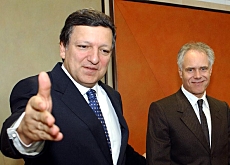
Brussels and Bern hold taxing talks

Switzerland and the European Union have failed to make headway over a tax dispute, with Brussels accusing Bern of granting unfair incentives to foreign firms.
After talks on Monday in Brussels, Swiss President Moritz Leuenberger and the head of the European Commission, José Manuel Barroso, could only agree to keep the door open for further discussion.
The EU Commission has been very critical of some Swiss cantons, which have convinced many foreign firms to move their headquarters there by granting them generous tax breaks.
The EU’s code of conduct forbids EU states to attract foreign companies with lower taxes than domestic firms.
Barroso repeated the commission’s position, saying the financial incentives amounted to little more than state subsidies, and were therefore in breach of Swiss-EU treaties.
Leuenberger rejected Barroso’s proposal to resolve the dispute through a framework agreement, reminding the Commission president that Switzerland was not a member of the EU. “This means Switzerland can act autonomously on this issue,” Leuenberger said. “There is nothing to resolve.”
Cohesion Fund
The two men were in agreement however that Switzerland should honour its commitment to pay SFr1 billion ($814 million) into a so-called Cohesion Fund earmarked for the ten newest EU members.
Swiss voters will go to the polls in November to decide on the contribution, and the latest survey published at the weekend showed the electorate divided over the issue.
Barroso said the economic and social “stability of the new EU states was in everyone’s interest, even non-member Switzerland’s”. Leuenberger said he was optimistic voters, when the time came, would approve Switzerland’s contribution.
Ahead of Monday’s meeting, Barroso told Switzerland’s NZZ am Sonntag newspaper that it would send a “very bad signal” if voters rejected the Cohesion Fund contribution.
Most analysts agree that even though the bilateral accords do not oblige Switzerland to make such payments, a “no” would strain Swiss-EU relations.
Barroso and Leuenberger also discussed the opening of an EU mission in Bern. Leuenberger said he was pleased that this would happen – in Barroso’s words – “very soon”.
“This reflects the current state of our relations and the desire to deepen those relations,” Barroso added.
The mission will be led by Austrian diplomat Michael Reiterer who is currently the EU’s number two in Japan.
swissinfo with agencies
Switzerland has been granting financial aid to countries in eastern Europe to help them transform into market economies.
As part of the second set of bilateral treaties with Brussels, non-EU member Switzerland, pledged to provide SFr1 billion over ten years to the ten new EU member states mainly in eastern Europe.
The funding will come mainly from cuts in aid programmes run by the foreign and economics ministries.
1972: Switzerland and the European Community sign a free trade agreement.
1992: Bern lodges an application for membership of the European Union. In the same year, the people reject membership of the European Economic Area.
2002: the first package of bilateral agreements with the European Union comes into force.
2004: Bern and Brussels sign a second package of measures.

In compliance with the JTI standards
More: SWI swissinfo.ch certified by the Journalism Trust Initiative















![The four-metre-long painting "Sonntag der Bergbauern" [Sunday of the Mountain Farmers, 1923-24/26] had to be removed by a crane from the German Chancellery in Berlin for the exhibition in Bern.](https://www.swissinfo.ch/content/wp-content/uploads/sites/13/2025/12/01_Pressebild_KirchnerxKirchner.jpg?ver=f05a5a9c)














You can find an overview of ongoing debates with our journalists here . Please join us!
If you want to start a conversation about a topic raised in this article or want to report factual errors, email us at english@swissinfo.ch.